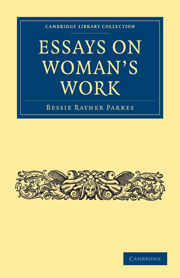II - THE CHANGES OF EIGHTY YEARS
Published online by Cambridge University Press: 05 July 2011
Summary
TOWARDS the end of the last century, when new theories of social life circulated in all circles, from the very courts of the most autocratic monarchs down to the literary middle-class, and in some countries to the lowest population, it was to be expected that women would both interest themselves in, and form the subject of, various opinions incident to the epoch. Rousseau was the apostle of one school of thought; but there is little evidence that his vigorous, ardent, but strangely twisted mind ever deeply affected this country. Here and there might be found an enthusiastic father, who, accepting part of his teaching, would insist on his children running barefoot and living according to the light of nature. But the more sentimental and questionable parts of Rousseau's philosophy found little favour here. Even the English writer of the last century, who might be generally supposed to have imbibed something of his doctrines, speaks with contempt of “Rousseau's wild chimeras” in regard to education, and with strong indignation of the corrupting tendency of his opinions on the education of girls, and appeals forcibly, not exactly to the Christian ideal, but to a sort of high Spartan virtue, which the benevolent minds of those days had convinced themselves to be possible of attainment, if only boys and girls could be trained from infancy according to its maxims. This notion that the root of all evil lay in bad primary education, was the predominant fixed idea of that day.
- Type
- Chapter
- Information
- Essays on Woman's Work , pp. 41 - 70Publisher: Cambridge University PressPrint publication year: 2010First published in: 1865

